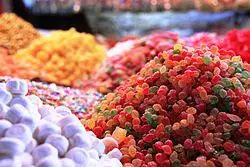candy
Candy, also called sweets (British English) or lollies (Australian English, New Zealand English), is a confection that features sugar as a principal ingredient. The category, called sugar confectionery, encompasses any sweet confection, including chocolate, chewing gum, and sugar candy. Vegetables, fruit, or nuts which have been glazed and coated with sugar are said to be candied.
Candy at a bazaar [集市] in Damascus [大马士革], Syria [叙利亚]

Physically, candy is characterized by the use of a significant amount of sugar or sugar substitutes. Unlike a cake or loaf of bread that would be shared among many people, candies are usually made in smaller pieces. However, the definition of candy also depends upon how people treat the food. Unlike sweet pastries served for a dessert course at the end of a meal, candies are normally eaten casually, often with the fingers, as a snack between meals. Each culture has its own ideas of what constitutes candy rather than dessert. The same food may be a candy in one culture and a dessert in another.
Before sugar was readily available, candy was based on honey. Honey was used in Ancient China, the Middle East, Egypt, Greece and the Roman Empire to coat fruits and flowers to preserve them or to create forms of candy. Candy is still served in this form today, though now it is more typically seen as a type of garnish.
Before the Industrial Revolution, candy was often considered a form of medicine, either used to calm the digestive system or cool a sore throat. In the Middle Ages candy appeared on the tables of only the most wealthy at first. At that time, it began as a combination of spices and sugar that was used as an aid to digestive problems. Digestive problems were very common during this time due to the constant consumption of food that was neither fresh nor well balanced. Banquet hosts would typically serve these types of 'candies' at banquets for their guests. One of these candies, sometimes called chamber spice, was made with cloves, ginger, aniseed [茴芹籽], juniper [桧;刺柏;杜松] berries, almonds and pine kernels dipped in melted sugar. 杜松子酒就是刺柏子酒或秦桧家酒嘛。
The first candy came to America in the early 18th century from Britain and France. Only a few of the early colonists were proficient in sugar work and sugary treats were generally only enjoyed by the very wealthy. Even the simplest form of candy – rock candy, made from crystallized sugar – was considered a luxury.
Candy generally contains sugar, which is a key environmental factor in the formation of dental caries (cavities). Several types of bacteria commonly found in the mouth consume sugar, particularly Streptococcus mutans [变形链球菌]. When these bacteria metabolize the sugar found in most candies, juice, or other sugary foods, they produce acids in the mouth that demineralize the tooth enamel and can lead to dental caries. X-men里的变种人mutan应译为变形人,因为没说会遗传。
Heavy or frequent consumption of high-sugar foods, especially lollipops, sugary cough drops, and other sugar-based candies that stay in the mouth for a long time, increases the risk of tooth decay. Candies that also contain enamel-dissolving acids, such as acid drops, increase the risk. Cleaning the teeth and mouth shortly after eating any type of sugary food, and allowing several hours to pass between eating such foods, reduces the risk and improves oral health. However, frequent consumption of fruits and fruit juice, which contain both acid and sugars, may be a more significant factor in dental decay than candies.
Most candy, particularly low-fat and fat-free candy, has a high glycemic index (GI) [升糖指数], which means that it causes a rapid rise in blood sugar levels after ingestion. This is chiefly a concern for people with diabetes, but could also be dangerous to the health of non-diabetics.
glycerine: 甘油; 丙三醇, from Greek glykeros 'sweet'
蜜饯mìjiàn: 糖渍水果。果脯guǒfǔ: 桃、杏、梨、枣等果类,用糖或蜜浸渍成之食品的总称。肉脯ròufǔ: 肉干。哺育bǔyù。
六级/考研单词: headmaster, ingredient, chew, gum, vegetation, nut, substitute, loaf, pastry, dessert, norm, casual, seldom, fingerprint, snack, constitute, revolve, medicare, spice, banquet, chamber, berry, pine, dip, melt, proficient, luxury, dental, cavity, bacteria, consume, cough, decay, oral, heal, rapid, diabetes




 浙公网安备 33010602011771号
浙公网安备 33010602011771号